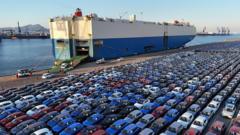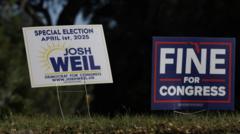The announcement of tariffs comes amid rising skepticism from key allies about their relationship with the U.S.
**Trump’s Tariffs Prompt Global Resistance in Wake of ‘Liberation Day’ Plans**

**Trump’s Tariffs Prompt Global Resistance in Wake of ‘Liberation Day’ Plans**
As President Trump prepares to unveil significant tariffs, U.S. alliances are increasingly strained.
President Trump is set to announce his “Liberation Day” tariffs, which are expected to target both adversaries and formerly close allies. This move has ignited concern among leaders of several countries who view the long-standing ties with the U.S. as deteriorating. The incoming German chancellor is particularly vocal about the need for greater independence from the U.S., while Canada’s new prime minister reflects on the end of a historically tight relationship.
Further compounding these tensions, Poland’s president has suggested the possibility of acquiring nuclear arms, signaling a dramatic shift in postures in Europe. Greenland's new leadership expressed outrage regarding recent U.S. overtures about the territory, declaring their intent to self-determine their future.
These reactions illuminate the broader implications of Trump's foreign policy approach, which has consistently involved critiquing NATO partners and questioning the European Union's role. The imminent tariffs have left political leaders across the globe anxious, with the financial markets reflecting this uncertainty.
While Trump's administration downplays the potential costs to American consumers and the retaliatory measures from affected nations, the absence of a clear cost-benefit analysis raises questions about the strategic choices being made. The anticipated fallout from these tariffs could challenge America's longstanding alliances, creating a ripple effect that extends beyond trade into geopolitical stability.
Further compounding these tensions, Poland’s president has suggested the possibility of acquiring nuclear arms, signaling a dramatic shift in postures in Europe. Greenland's new leadership expressed outrage regarding recent U.S. overtures about the territory, declaring their intent to self-determine their future.
These reactions illuminate the broader implications of Trump's foreign policy approach, which has consistently involved critiquing NATO partners and questioning the European Union's role. The imminent tariffs have left political leaders across the globe anxious, with the financial markets reflecting this uncertainty.
While Trump's administration downplays the potential costs to American consumers and the retaliatory measures from affected nations, the absence of a clear cost-benefit analysis raises questions about the strategic choices being made. The anticipated fallout from these tariffs could challenge America's longstanding alliances, creating a ripple effect that extends beyond trade into geopolitical stability.





















